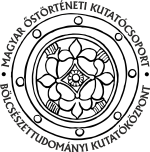Anatomy of conquest. A previously unrecognised eastern parallel of Anonymous’ conquest history: the foundation of the Kara Khitai Empire
B. Szabó János / János B. Szabó
Hadak útján. A népvándorláskor kutatóinak XXIX. konferenciája. Budapest, 2019. november 15–16. / 29th Conference of scholars on the Migration Period. November 15–16, 2019, Budapest
MŐK Kiadványok 4.1 (2022) 491–498
DOI 10.55722/Arpad.Kiad.2021.4.1_27
A hazai mainstream középkorkutatás számára már rég evidenciának számít, hogy Anonymus Gesta Hungarorumának honfoglalás története pusztán fikció. Az azonban kiváló tudósok egész sorát izgatta, hogy egyfajta „virágnyelven” nem adotte elő mégis Anonymus egy releváns történetet a későbbi korszakokra, leginkább saját korára nézve. Írásunkban ettől a – mostanra tehát már szinte megszokottnak tekinthető – metódustól eltérő módon nem a Magyar Királyság 11–12. századi belviszonyaiban, vagy a bizánci császárság nagyhatalmi törekvéseiben keresünk Anonymus szövegének értelmezéséhez támpontokat, hanem annak narratív vázát kíséreljük meg összehasonlítani egy távoli, ámde a történettudomány jelenlegi állása szerint valós „honfoglalás” narratívájával. Jelenlegi vizsgálódásunk kiindulópontja ez esetben a távoli ÉszakKína és a mai Mongólia területe, ahol az 1120as években a mai Mandzsúriában élő dzsürcsik megdöntötték a kitan Liaodinasztia (907–1125) birodalmát. Az összeomlás időszakában azonban a kitan uralkodócsalád egyik tagja, Jelü Tasi herceg 1124ben előbb a birodalom legnyugatibb szegletében összegyűjtötte az elérhető erőforrásokat, majd népével nyugatra vándorolt és BelsőÁzsiában hamarosan új birodalmat alapított. A szembeszökő hasonlóságok értékelése – a további és igen szerteágazó kutatások szükségességét látva – egyelőre még nem lehet munkánk célja. Jelen esetben így csupán egy, a modern tudományosság által megtörténtnek minősített, 12. századi eseménysor, a kitan „honfoglalás” és az Anonymus „regényes gesztájában” szereplő honfoglalásnarratíva szemléletének szembeötlő rokon vonásaira kívántunk rámutatni.
Kulcsszavak: Anonymus, Gesta Hungarorum, kitanok, Karakitaj Birodalom, Árpád, Jelü Tasi
The purely factious character of the story related by the anonymous notary of King Béla about the Hungarian conquest of the Carpathian Basin is a well-established and widely held view in Hungarian medieval studies. In line with this assumption, long generations of eminent medievalist have been engaged in the exploration of whether Anonymous had in fact told a true story of a later period, primarily of his own age, encrypted in his conquest narrative. The present discussion diverts from this perspective. Instead of seek-ng the springboard of its interpretation of the anonymous notary’s description either among the internal struggles of the eleventh–twelfth-century Hungarian Kingdom or in Byzantium’s aspirations to great power status, the present paper makes an attempt to compare the Gesta’s conquest narrative with the pattern of another conquest, which, although it took place in a faraway region, is accepted as historical in modern historiography. For this reason, the events having taken place in the 1120s in Northern China and present-day Mongolia, namely the Jurchen overthrew of the Khitan Empire of the Liao dynasty (907–1125), are scrutinised. As a paradigm to Árpád’s conquest of the Carpathian Basin, the story of Yelü Dashi, a member of the Khitan ruling family, and his people gathered from among the ranks of his Khitan subjects is offered here. The present study describes how he fled northwest to the border area of his Empire in order to collect the available resources in 1124, and how, after their westward migrated, they managed to establish a new, flourishing polity in Inner Asia. In view of the need of further in-depth research, the present paper cannot aim to offer a systematic evaluation of the whole set of obvious similarities. Therefore, its main objective is to point out the major affinities in terms of the paradigms between the conquest narrative of Anonymous’ “fictional Gesta” and the historical twelfth-century Khitan conquest of a new territory.
Keywords: Anonymus, Gesta Hungarorum, Khitan, Khitan Empire, Árpád, Yelü Dashi





